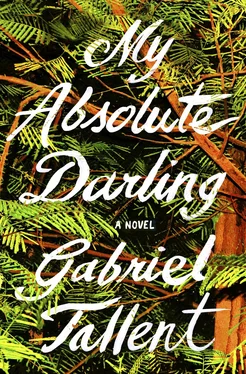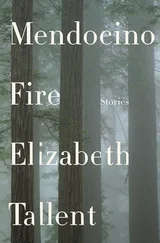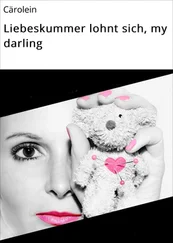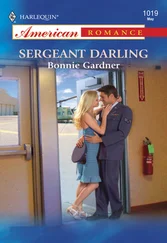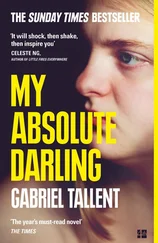The door to the master bedroom’s mudroom opens, and Martin comes out and stands on the small master bedroom deck, on the south side of the house, looking out over the field. He has a gun laid back over his shoulder, she can’t tell which. With the spotlights shining down at her, he’s nearly impossible to pick out on the deck, like a figure standing just to the right of the sun. He waits there, spread-legged and patient, and she can imagine his careful breathing as he looks out into the field. She buries her face, keeping the whites of her eyes in the grass, and she breathes, waiting for him, knowing that he will never see her. She thinks, there was something wrong with that story about that cat. He doesn’t see things like they are, not clearly.
Martin walks back inside. She hears the door slam closed. She exhales, raggedly, and slithers through the wild oats, searching with her fingertips until she finds what she’s looking for, what she’d pitched discreetly out into the grass when she’d gotten out of the passenger-side door.
She finds it, and puts it to her face, and breathes into it. Then she returns, the motion-activated lights clicking back on. She crosses the intervening space quickly, lays the shirt over her shoulders to free her hands, and mounts up onto the wall. She climbs around a window and steps into the inside corner formed between the walls of the foyer and the second story, scrambles up the foyer’s roof, and then climbs across the side of the building toward her window. She hears Martin’s door slam open, hears Martin come out onto the south deck. He is hidden from her by the foyer. Above her, the bay window projects out away from the wall by three feet. She clings to the rose canes beside and below it, looking up at it and hearing Martin’s footsteps, and then she vaults up and out. She grasps the windowsill and hangs one-handed, her feet in open air. She matches her other hand onto the windowsill and slips through it and muddily onto the floor. She holds the cotton scrap. Below her, Martin walks out into the yard. She peeks over her window, breathing hard. He stands beside the trash barrel, looking into the grass, and turns to look at the house. When he is gone, she relaxes against the wall.
It’s Jacob Learner’s T-shirt. It shows a candle in the center, and around the candle, a twist of barbwire. Above that, an arc of stars. The shirt reads AMNESTY INTERNATIONAL. She sits chewing on her fingers, naked legs akimbo on the cold wood floor, scattered muddy prints of her heels. She plants her hands on the shirt.
Arriving from the raspberries, Turtle hears Rosy heave herself up and come to the door, shaking herself off and setting her collar to tinkling, then Grandpa opens the door and looks down at her. “Sweetpea,” he says, “would you give me a hand with this pizza?”
She leans the rifle against the jamb, pulls the pizza deftly out of the oven, and drops it onto a cutting board. She accepts a chef’s knife from Grandpa, tests it with a thumb, and divides the pizza into slices.
“Oh good,” he says, watching the knife sticky with cheese, “oh good.”
“Grandpa,” she says, “you have to eat some other things, sometimes, not just these pizzas.”
“Oh, it’s fine,” he says, “it’s fine. I’m long past worrying about my health, sweetpea.”
They move to the table. “It’s a rare thing, have you here for dinner,” Grandpa says. He means it as a question.
“Yup,” Turtle says.
He sits with one hand on a bourbon glass filled with chilled soapstones. His jowls hang down and he looks like he is frowning. She unholsters the Sig Sauer, drops the magazine, locks back the slide, and sets it on the table. It reeks of gunpowder. The exposed barrel is laddered with powder residue, the frame is smoked with it, her fingertips black with it, her trigger finger brassy. She shucks aside the card case, raps the deck smartly, shuffles.
“Well,” he says. “Tell me you didn’t take that to school.”
“I didn’t take it to school,” she says, then cuts, shuffles, deals.
He collects his cards. They shake in his hand with a papery rattle. He says, “The pines on the north side of the gulch have started to die, and on towards Albion, along the highway there at the bend, more of them are dying. It may be that pine beetle that everybody is talking about, I don’t know what, sweetpea.”
Turtle discards into the crib. Those pines have been dead for a long time.
Grandpa touches and sorts his cards with a trembling hand.
“It’s getting on towards the end of the year,” he says.
She looks up at him. She doesn’t know what he can mean. He sorts his cards.
“What was I—?” he says after a moment.
“I don’t know.”
His eyes are yellow. He runs his tongue over his lips.
“Well, what was I saying?”
“The pines, the end of the year, but it’s not the end of the year, Grandpa.”
“Well, I know that,” he says. The game has stalled as he considers it. At last, he says, “The bees are dying. Six hives, sweetpea, and five of them dead.”
She says nothing.
“I don’t know why.” He scowls. “Some mite, something. Maybe it’s my fault.”
“It’s not your fault,” she says.
“Maybe I—” He gestures. “Forgot something.”
“You didn’t forget anything.”
“Six hives,” he says, “and five of them dead, the larva capped in their cells. The workers just don’t come back, I don’t know why. Must be something I did.”
She waits for him to discard into the crib.
“Can’t think of what it might have been. Ah. Ah. The end of the year. Isn’t there a thing you do?”
“Grandpa, it’s May.”
“A thing you do at the end of the year,” he says.
“I’ve no idea what you’re on about?” Turtle says.
“Prom,” Grandpa says.
“Not prom,” she says, because prom is high school. The dance is on May 16, in less than two weeks. The last day of school is June 10.
“Well, now,” Grandpa says, and discards into the crib. Turtle cuts the deck, Grandpa draws the starter, a jack, and Turtle pegs two for his nibs. They are back on it now. “Well,” he says, “well, now.” He picks up his cards, throws an eight.
Turtle throws a seven, pegs two.
Grandpa throws a nine, pegs three for the run of 7-8-9.
“So will you go to the dance?”
She laughs. He nods to the Sig Sauer, and the gesture is very like Martin.
“I can’t believe he lets you run around with this,” he says.
“Yeah?” Turtle says.
“I can’t believe how that man is raising you.”
“He loves me,” Turtle says.
Grandpa shakes his head.
“He loves me very much,” Turtle says.
“Don’t you do that, sweetpea.”
“What?” Turtle says.
“Don’t be twisting things up like that. You can’t be saying one for the other like that, sweetpea, so don’t you start.”
She cracks her knuckles, thinking, sorry, I’m sorry.
“This is our town. This is your town. The people here are your people . And you’re toting that thing around. ” He fastens on his whiskey glass, his eyes becoming harder and harder, his aspect changing very little or not at all, but suggesting somehow a slow solidifying of his bitterness. He picks up a bottle of Tabasco and begins dashing it onto the pizza. Then he lifts a slice and holds it in trembling hands and sets it down. He picks his cards up and the game moves on in silence. She can see it in his face, how he can’t get it straight and how he sits there wishing he could.
After a while he says, “Well, isn’t there a boy?”
“There’s no boy.”
Grandpa looks up at her now and looks at her very searchingly.
Читать дальше
Конец ознакомительного отрывка
Купить книгу
